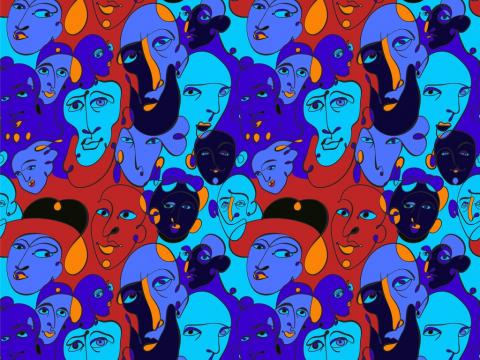A Guide to Understanding Racial Trauma

By Vanessa Boachie, Psychological Therapist and Founder of Inside Out Well-being. Find out more about Vanessa here.
The events of this year have encouraged us to have difficult conversations. As uncomfortable as these conversations can be, it has also been an opportunity to gain new knowledge, build understanding, and make progress in our personal and professional lives.
A topic that became centre of attention for many of us last summer is the term psychologists refer to as, ‘racial trauma’. For many people, last year was the first time they had openly acknowledged and discussed the existence of racial trauma. This created a space where people were able to make sense of their lived experiences. For others, educating themselves on this topic helped to inform them of how they could support others.
Even so, talking about the intersection between race and mental health is not just a one-time thing, it’s an ongoing challenge that affects the day to day lives of people from racialised communities, so let’s keep the conversation going. In this blog, we explore what racial trauma is, how it manifests and how you can look after your mental health.
What is racial trauma?
Racial trauma can be described as the stressful impact, psychological trauma and emotional pain that occurs as a result of direct or indirect experiences of racism.
Examples of direct racism are hate crimes, racial assault or workplace discrimination, whereas indirect experiences of racism can be considered as microaggressions (a comment or an action that communicates hostile, derogatory or negative messages towards a member of a racialised group, often unconsciously or unintentionally) or even witnessing racial discrimination towards another person from a racialised community. Whether the incidents of racial discrimination are direct or indirect, researchers have found that these ongoing experiences can lead to emotional injury which can be referred to as, racial trauma. Even if the racial discrimination is perceived, it can lead to similar effects.
What are the symptoms of racial trauma?
Typically, racial trauma has symptoms that mirror key indicators of Post-Traumatic Stress Disorder (PTSD) as defined by the Diagnostic and Statistical Manual of Mental Disorders, 5th Edition (DSM-5 Criteria for PTSD).
People may experience symptoms such as:
- Re-experiencing of the trauma
- Hypervigilance
- Arousal: higher reports of somatisation when distressed (stomach aches, heart palpitations, headaches)
- Avoidance of trauma reminders
- Negative mood/thoughts and anxiety
This is not an exhaustive list and there are differences for individuals.
What are the impacts of racial trauma on mental health?
There is a link between cumulative exposure of racism and long-term poor psychological functioning. Those exposed to racism may be more likely to experience mental health problems such as psychosis and depression. As a therapist, the impacts of racial discrimination can often be presented in therapy sessions with clients experiencing exhaustion, chronic stress, anger, anxiety, helplessness and low self-esteem linked to their experiences of racism. It is not surprising that being discriminated against because of the colour of your skin can be very stressful and have detrimental impacts on your health, mentally and physically.
What are the impacts of racial trauma on physical health?
The impacts of racial trauma are not limited to mental health, there is growing research to suggest that racial discrimination can also lead to physical health issues such as:
- High blood pressure
- Physical pain
- Digestive issues
- Cardiovascular disease
As there is a strong link between mental health and physical health, these examples demonstrate how chronic stress and emotional pain can manifest in the body and lead to physical health conditions.
What does this mean for mental health support?
These impacts can be exacerbated by the inequalities in mental health care, particularly the lack of access to adequate mental health support. Unfortunately, more often than not, racial trauma is missed by mental health professionals because they are uninformed of the psychological impacts of discrimination.
Many often fail to recognise experiences of racism as traumatic, or fail to explore experiences of racism at all, especially if they are a White clinician. Hence why, it is important for us to explore the intersectionality between race and mental health. Through having these difficult conversations, it has given us the opportunity to learn that mental health services can be improved by providing racially informed and culturally sensitive support for racialised people and communities.
Tips to combat racial trauma
- Recognise how racial trauma is having an impact on you - people respond to racial trauma differently, so building awareness on how it has an impact on you is important. A good starting point would be to write down the symptoms you have noticed and identify any situations, places or people who trigger your symptoms
- Connect with yourself - engage in activities that help you to focus on the present such as mindfulness, this can be a helpful coping tool. Here is a 17-minute guided meditation that you can try: Black Lives Matter Meditation for Healing Racial Trauma by Dr Candice Nicole
- Connect with others - being seen and heard is a key aspect of healing so connect with others (friends, family, colleagues) who are able to engage in racially conscious conversations with you. This can give you opportunities to connect people who you can relate which can help to reduce stress
- Seek professional support - You can find localised services that cater to your individual needs on Spark & Co’s resources page. Organisations like Black Minds Matter, Our Naked Truths and Frontline Therapy provide culturally sensitive support.
